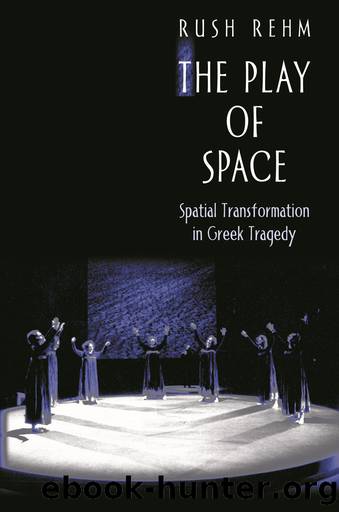The Play of Space by Rush Rehm;

Author:Rush Rehm;
Language: eng
Format: epub
Publisher: Princeton University Press
Published: 2020-07-15T00:00:00+00:00
Persians
Reason respects the differences and imagination
the similitude of things.
—Shelley
It is hardly possible to overestimate the importance for Western
literature of the Iliad’s demonstration that the fall of an enemy,
no less than of a friend or a leader, is tragic and not comic.
—Northrup Frye, Anatomy of Criticism
Our earliest surviving tragedy (dated to 472), Aeschylus’ Persians is anomalous in many ways, most notably for dealing with a near-contemporary event, Xerxes’ defeat at Salamis (480) and the disastrous retreat of his expedition back to Persia (479).11 In part because of its historical focus, the setting of Persians also defies expectations, and scholars remain divided as to precisely where the play takes place. The scenic space clearly lies within Susa, the capital of Persia, but after that uncertainty reigns. Initially the Persian elders of the Chorus seem to gather outside their chamber, perhaps represented by the skēnē. When they “sit down in the ancient building” (140), however, they seem to have moved indoors; the queen (unnamed in the play, but traditionally called Atossa, the wife of Darius and mother of Xerxes) arrives in a chariot, which takes us back outside; then we find ourselves transported to Darius’ tomb; after the ghost-raising sequence—reminiscent of the kommos in Choephoroi—the grave effectively disappears, and the rest of the play takes place in an open area somewhere in the capital.12
On the basis of this variability, and lacking clear evidence to the contrary, Taplin draws the unlikely (but now generally accepted) conclusion that the pre-Oresteia theater of Dionysus lacked a skēnē.13 However, such a facade proves perfectly viable for Persians, providing the backdrop for the Chorus’s gathering, and the logical place (given the resources of the Greek theater) for the appearance of the ghost of Darius, who speaks like a god from on high.14 As with Agamemnon’s tomb in Choephori, his grave would have been located in the center of the orchestra; the unexpected appearance of his ghost on the roof—behind the immediate focus of dramatic attention—spatially highlights the power of the supernatural, lending Darius’ appearance and pronouncements added significance.15
Scholars rightly emphasize that Persians shares the typical tragic concern with an important family, in this case the house of Darius and the Achaemenid line.16 However, by not placing the action before the royal palace, Aeschylus “communalizes” the situation. In spite of the hierarchy and tyranny represented by Xerxes, his disaster signals more than the fall of a house. In this context we can compare the nostoi of Agamemnon and Heracles discussed in chapter 2, where a triumphant eponymous hero returns to his own home, only to meet unexpected disaster within its walls. Aeschylus in Persians alters this pattern: first, the king returns in utter defeat and, second, he arrives not at his own home but at a public area, where he is met not by his own family (as hinted at earlier in the play) but by the community he has failed, its importance signaled by the play’s title. Recall that at the end of Agamemnon Aegisthus stands before the
Download
This site does not store any files on its server. We only index and link to content provided by other sites. Please contact the content providers to delete copyright contents if any and email us, we'll remove relevant links or contents immediately.
Call Me by Your Name by André Aciman(19903)
Ready Player One by Cline Ernest(13989)
How to Be a Bawse: A Guide to Conquering Life by Lilly Singh(7156)
Wiseguy by Nicholas Pileggi(5318)
The Kite Runner by Khaled Hosseini(4952)
On Writing A Memoir of the Craft by Stephen King(4664)
Audition by Ryu Murakami(4616)
The Crown by Robert Lacey(4572)
Call me by your name by Andre Aciman(4463)
Gerald's Game by Stephen King(4376)
Harry Potter and the Cursed Child: The Journey by Harry Potter Theatrical Productions(4314)
Dialogue by Robert McKee(4160)
The Perils of Being Moderately Famous by Soha Ali Khan(4064)
Dynamic Alignment Through Imagery by Eric Franklin(3920)
Apollo 8 by Jeffrey Kluger(3512)
How to be Champion: My Autobiography by Sarah Millican(3493)
The Inner Game of Tennis by W. Timothy Gallwey(3472)
Seriously... I'm Kidding by Ellen DeGeneres(3412)
Darker by E L James(3407)
